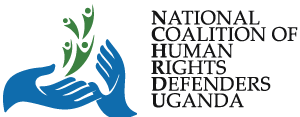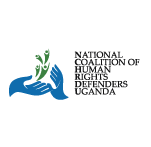- February 12, 2020
- Posted by: hrdcoalitionAdmin
- Category: News Updates
By John B. Thawite
As Uganda continues to undergo a democratic metamorphosis, Human Rights Defenders (HRDs) in the country have been warned against being confrontational while executing their work.
The advice was sounded by the Executive Director, National Coalition of Human Rights Defenders, Uganda (UNCHRD-U), Robert Kirenga.
Kirenga was addressing a Rwenzori regional dialogue meeting convened by the Coalition with support from the Democratic Governance Facility (DGF to bring human rights activists and state duty bearers at Spring International Hotel in Kasese Municipality.
According to the NCHRD-U’s Advocacy and Networking Officer Edward Serucaca, the Friday meeting was themed on advancing collaboration with duty bearers towards improved working environment for human rights defenders in the Rwenzori region.
The meeting comprised state actors that represented the office the Resident District Commissioner (RDC), the Internal Security Organisation (ISO) police, the Electoral Commission (EC) and the Uganda Human Rights Commission (UHRC).
Also present were Prime Minister of the Bundibugyo-based Obudingiya Bwa Bamba (OBB), the leader Banyabindi cultural, the media and various human rights organisations operating in the Rwenzori region.
ACCUSATIONS
During the dialogue, most particioants faulted state security agents, mostly the police, for being the biggest human rights violator.
Alice Kabayogya of the Fort Portal-based Kabarole Research and Resource Centre alleged that in some cases, some police officers demand sex or money to handle their issues.
“Unable to raise the money and fearing the sex demands, the female victims are forced to go away and drop the cases,” Kabayogya said.
She however, challenged fellow women to familiarise themselves with the human rights laws if they are to effectively fight the various violations against them
“Unfortunately there is gap between the grassroots woman and their highly-placed well-informed counterparts don’t help the less fortunate ones,” she noted.
She also lashed at cultural practices, beliefs and norms which regard women as second-hand citizens and gag them in decision-making.
“Once a woman becomes a human rights activist, her family and her community start labeling her as a ‘wrong woman’ and may even start telling her husband to find another one,” she said.
JOURNALISTS UNDER SUPPRESSION
The journalists cited oppressive laws and intimidation as some of the impediments to their work.
Simon Bikeke, the coordinator Umbrella for Journalists of Kasese (UJK) recalled how a radio journalist was arrested while covering a political party meeting in Kasese.
He also cited another incident in which gadgets of a fellow journalist were also confiscated and returned after security operatives had tampered with them.
“What safety guarantees is government going to accord the media especially in the next year’s elections,” he asked.
RWENZORI CHALLENGES
The NCHRD-U Regional Focal Person, Charles Masumbuko, said the Rwenzori region was characterised by land grabbing, hate speech especially by leaders.
“Our other challenges include arbitrary arrests, detentions, child rights violations and disruptions of assemblies organised by HRDs,” he said while highlighting the operating environment of the HRDs in the region.
The human rights groups also alleged that the police resort to use of force like tear gas because they have failed to interpret the Public Order management Act (POMA).
Aaron Sibaheswa, who represented the Persons With Disabilities, said working as a human rights defender is risky because “it steps on other people’s toes.”
During elections, some powerful PWDs have often locked up their less empowered colleagues who may be politically opposed to them,” said Sibaheswa.
UHRC SUFFERS CASE BACKLOG
The Human Rights Officer of the Fort Portal-based Uganda Human Rights Commission legal officer, Albert Mwebaze, said the commission was so overloaded with a case backlog of 3,000 owing to understaffing.
He advised communities to utilise the community structures including the LCs and traditional structures to settled cases out court.
Mwebaze further said ignorance of the laws was among the drivers of crime partly because citizens don’t understand the laws, which are mostly written in English.
“Yet nobody or organisation can translate the laws without being vetted and cleared by the Uganda Law Society,” Mwebaze said.
NCHRD-U INSISTS
However, the NCHRD-U Executive Director, Robert Kirenga, stressed that as stakeholders in the promotion of good governance, the HRDs should not be the breakers of the laws.
“Human rights defenders are not political activists. Those who do so risk attracting the coercive arm of the state,” he warned.
“If as human rights defender you have adhered to all the requirements but police still rejects the request, take your complaint up with us for further action,” he said.
He cautioned, “If police tell you to disperse, comply. There is nothing worth more your life. Who will support you children or your spouse in case you die on duty?”
Kirenga also cautioned them against moving alone while following up human rights violations.
But he challenged state organs like the police to “create an enabling environment” for the HRDs.
POLICE REACT
However, the Rwenzori East Regional Police Commander, SP Samuel Asiimwe, rubbished allegations that police cannot interpret the POMA, stressing that the role of police is to enforce it.
He reminded the dialogue that the role of the police is to enforce laws such as the Public Order management Act (POMA).
He challenged the Human Rights defenders to fulfill the POMA conditions that govern public assemblies.
He stressed that so long as organisers of public meetings don’t inform and get permission from police, they will always be coerced.
The Rwenzori east regional police spokesperson, ASP Vincent Tweisgye, cautioned the media against being used by politicians.
“Teargas is an internationally means of disbursing law breakers so we shall continue to apply it,” Twesigye said.
CRIME NOT NEGOTIABLE, KABAROLE RDC
The Kabarole RDC, Steven Asiimwe, asked the particioants, “if you defy the laws of the country in the name of doing your work, what do you want police to do?”
He challenged them to finger-point at errant police so that the Police Standards Units can discipline them.
The Electoral Commission District Registrar and Returning Officer, Sulaiman Kato, cautioned the human rights activists against breaking the electoral law under the pretext of fulfilling their mandate.
“Don’t compel us to declare election results before the due process are complete,” he said.
Kato told them that an election result can only be declared on the basis of Declaration Forms (DR) from polling stations.
He challenged them to internalize the electoral law to avoid being caught on the wrong side.
“How many of you for example can able describe the electoral process and help to mobilise the public on their roles and responsibilities accordingly?” Kato asked.
He also educated them that the electoral Commission handles only pre-election and polling issues while post-election complaints go to courts of law.
He noted that some Ugandans have become so ambivalent that they even bother to update their particulars during the voter registration update.
“When they find themselves missing on the registers, you are likely to fault the electoral commission for mismanaging the process.
Kato further urged those wishing to monitor the elections to immediately seek accreditation with the Electoral Commission to avoid being harassed.
CULTURAL INSTITUTIONS LAW WANTING
The Kasese district chairman, Geofrey Sibendire Bigogo, blamed the recurrent inter-cultural conflicts in the Rwenzori region partly on the lacuna in the law.
Article 246(1) says a cultural or traditional leader “may exist in any of Uganda in accordance with the culture, customs and traditions or wishes and aspirations of the people to whom it applies.”
However, Bigogo, a lawyer-turned-politician, explained that the laws it is silent on how cultural leaders should relate geographically.
In 2009, government recognised the mainly Bakonzo-based Obusinga bwa Rwenzururu (OBR) cultural institution with Charles Wesley Mumbere as its leader.
In 2014, government also recognised the Bamba-dominated OBB with retired army officer, Martin Kamya, as its leader.
But Bigogo said though the subjects of the two cultural institutions live in Kasese and Bundibugyo, Mumbere and Kamya cannot easily visit their subjects without sparking off some animosity.
In Kasese, Mumbere’s efforts to visit the lowlands, which are dominated by the Basongora and Banyabindi, have in the past been resisted.
The Rwenzururu leaders have also frowned at demands by the minorities to have their own cultural leaders.
He implored the Coalition to advocate for a change in Article 246 of the Uganda constitution that establishes cultural and traditional institutions.

